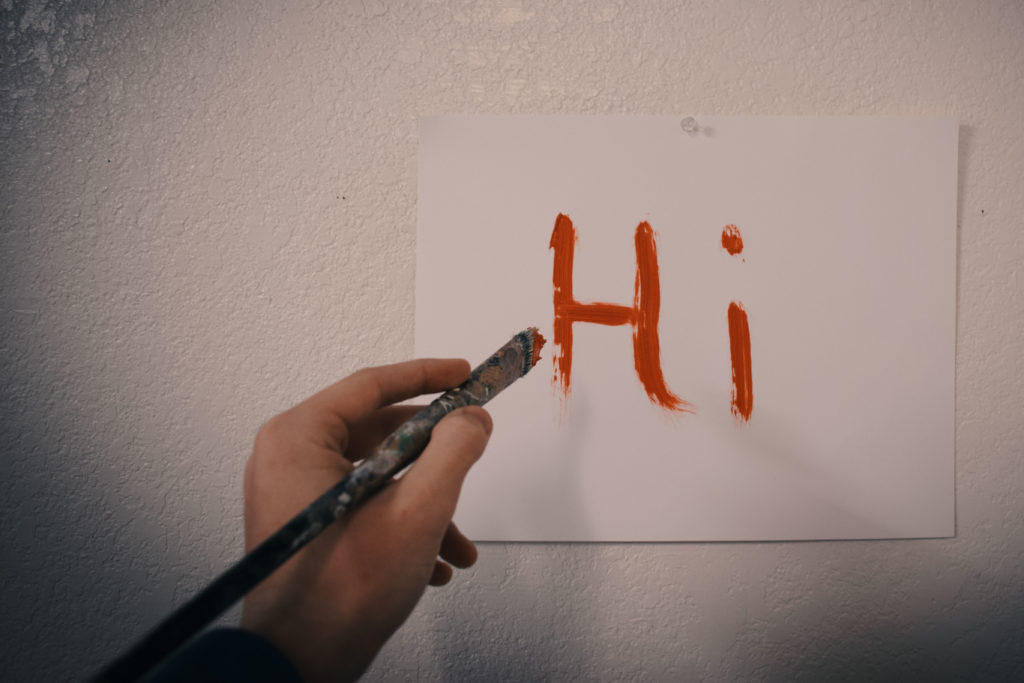How to Speak With Artists Part 1: A Guide for Writers Interested in Hiring Artists

Artists. Apparently writers are included in this group, though most of us (me) can’t draw a straight line. I should show you this quiz I did in a drawing class years ago that had the word artist and a line where my name went. I put a question mark behind so it read “artist?” and got marked down in points for and a red penned, all-caps “YES” in response to make a point.
Some day you fellow writers may find yourself finished with that postmodern Pulitzer Prize winner and want to have a cover designed for it or have some “art thing” to go along with it for marketing purposes. So you peruse your friends list and see who you can reach out to. Before you bombard them with your weird request, bear these ten things in mind that I, a writer, have gleaned from my encounters with the beings from the other buildings:
- Exposure Doesn’t Pay the Bills:
I hear this from my artist friends all the time, no matter the field. One of the biggest excuses people use when trying to get someone to do free work for them is that it’ll basically look good on their resumes or put them in the spotlight so to speak. If we could print out our resumes and eat them for sustenance or absorb that spotlight like a plant would sunlight and grow stronger from it, that would be a fine method of compensation. As it stands, we are not at the plant form in our evolution, so be sure to ask the artist if they would prefer cash or cheques.
- Neither Does Experience:
Just another not so clever way of saying, “I don’t value what you do at all and am not planning on paying you for it.” Experience is fantastic, and in order to stand out in this highly competitive world, both writers and artists need tons of it. However, they also need food and water and roofs over their heads. Check under the couch cushions for runaway quarters, consider donating plasma, whatever you have to do to make the cash to pay the artist you hired.
- Not Paying the Artist is Just Bad:
I should hope that no one would do this, because it’s basically stealing and just rude. This includes making excuses like “I’ll pay you half now…” or “I need another week to get payment ready.” If it won’t fly with your angry looking landlord it won’t fly with the artist. If you are so deplorable as to do something like this, you may also face legal action. So either be prepared to pay up on the agreed date or don’t hire the artist.
- Telling the Artist How to Do Their Work is a Mortal Sin:
Bear in mind that making a humble request as part of the commission or specifying things, like in a comic script, are not the same as outright telling an artist how to do their job. Approaching an artist for a logo design, for example, and saying “Can you do this in the style of so and so?” or “Just do it like they did, but with my company’s logo” is wrong. Specifying that you want an aerial shot for a panel of the graphic novel you’re writing is not. Find a balance here for your own requests.
- Telling the Artist That You Could Do It:
Great. Scamper off and do it then.
- Telling the Artist That You Could Get it Done Cheaper or Faster Elsewhere:
Again, this is fantastic news. Consult them instead.
- Telling the Artist You Have a Relative or Know Someone Who Could Do it For Less, Any Variation of This, Or the Ones Listed Above:
Wow. I didn’t know your aunt Cathy was a master printer. I’m so happy for her. Why did you beseech me for help with your project, again?
- Vague Requests Are Just Annoying:
Saying “I want it to be blue” doesn’t give the artist anything to work with unless they are the literal reincarnation of Yves Klein. Also, your lack of details make you look bad as a writer. Shame, shame. Don’t go overboard with details either. Find a balance.
- Reference Images Help, but Don’t Overdo It:
Similar to making grievous requests, this comes across as “Do it this way!” to the artist and shows that you don’t trust their judgment or creativity to produce something awesome. However, using a few reference images is fine. It may even help the artist gain more ground on just what it is they’re producing for you.
- Understand That Art Takes Time:
Perhaps the intense deadline after deadline nature of being a SCAD student has warped your perception of how art works. The artist probably won’t give you what you desire overnight, so plan accordingly. Set a deadline, but be flexible if you can be. Wait patiently for the masterpiece, checking in occasionally, but not too often. Rome wasn’t built in a day, your weird Avant-Garde book cover won’t be done in a day either.
These are just ten things I’ve picked up from artists I know. If you have any more, leave them in the comments section below. Also, bear in mind fellow wordsmiths, that these are by no means the only rules and etiquette you should follow when dealing with artists. A lot of things are entirely unspoken and you’ll only find out about them after you totally screw something up, so have fun on your artist hunt!























